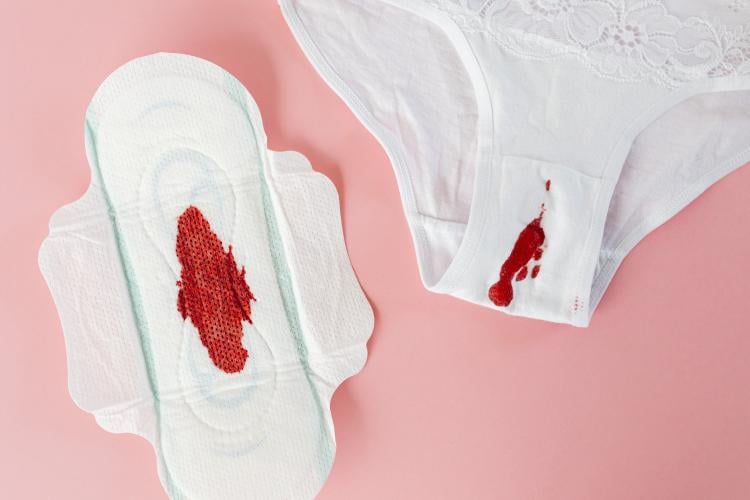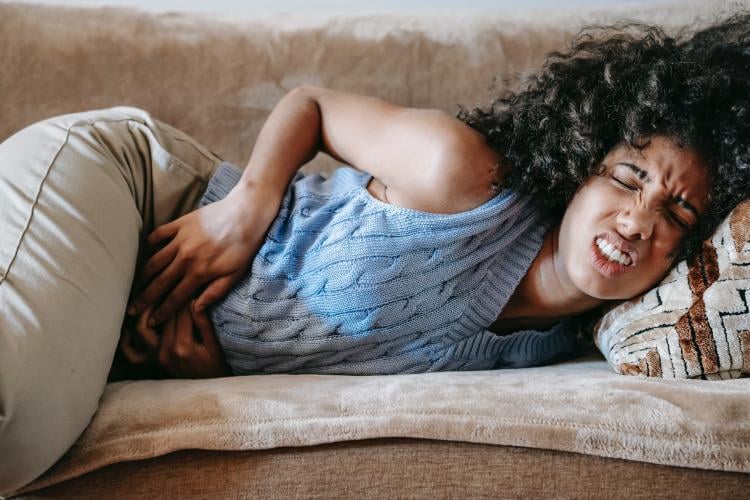
A regular menstrual cycle lasts 21 to 35 days for most women. However, 14 to 25% of women have irregular menstrual cycles, which means their cycles are shorter or longer than average, heavier or lighter than normal, or they encounter other difficulties, such as abdominal cramps. It is always important to go to the doctor if you feel there is something wrong with your period. They will be the best ones to help you and give you advice. For now, I am going to let you know more about What menstrual irregularities are and what does it mean.
Keeping an eye on your monthly cycles can help you understand what's normal for you, what your time ovulation is, and notice significant abnormalities, such as a missed period or erratic menstrual bleeding. While menstrual period anomalies are usually not a big deal, they might occasionally indicate some health issues.

The menstrual cycle is a monthly set of changes that a woman's body undergoes in preparation for pregnancy. Each month, one of the ovaries would produce an egg, a process known as ovulation.
Simultaneously, hormonal processes prepare the uterus for pregnancy. If ovulation occurs but the egg is not fertilized, the uterine lining sheds down meaning that you will have your period. This is a menstrual cycle.
Each cycle is different in every woman. You can measure it from the first day of your period to the first day of the next. Menstruation can happen every 21 to 35 days and last two to seven days, depending on the person. Long cycles are frequent in the first several years after menstruation begins. These periods, on the other hand, tend to shorten and become more regular as you get older.
Your menstrual cycle may be regular or irregular it can also be light or heavy, painful or pain-free, long or short, and yet be considered normal. Each person is different and what is normal to one might not be normal for the other one. This is why it is really important to keep an eye on how your body flows. You will also have to keep in mind that certain contraception methods, such as extended-cycle birth control tablets and intrauterine devices, can cause your menstrual cycle to change. always, You should check your doctor if you notice something different than usual. They are professionals and would be glad to help you.
There are many different reasons why you might be suffering period irregularities. Your period may become irregular as you approach menopause. However, because the risk of uterine cancer grows with age, talk to your doctor about any abnormal bleeding throughout menopause, if this is your case.
A good idea to start monitoring your period could be to start maintaining a calendar record of your menstrual cycle to figure out what's usual for you. Begin by keeping note of your start date every month for many months to determine the frequency of your periods.
some questions that you can ask yourself are: When is my period supposed to come? How long does my cycle usually last? Is it a little longer or a little shorter than usual? you can always be ready if you do not have the exact time of your period, by carrying around some sustainable organic tampons. They are small and easy to place on your backpack or purse. There are different organic brands and you can get to know them all in this article Organic Tampons: Best Brands Available in the Market. However, if you are not a tampon fan like me, there are organic pads alternatives that are also sustainable. They are soft with your skin and will not leak. You can get a look at them in our article Feminine Hygiene: The Best Cotton Pads For Periods
If you are suffering from menstrual irregularities, why not try to make a note of how heavy your flow is. Is it always the same? Is it lighter or heavier than normal? How frequently do you need to change your sanitary protection? Do you have any blood clots? Answering all these questions will help you understand your cycle better.
If you are experiencing too much flow, there are different sustainable alternatives to regular pads or tampons that will help you overcome this situation. The best alternative to tampons or pads that you could ever find would be switching to the menstrual cup. Not only it is sustainable but it is also healthy for your body. Regular tampons might leave traces on your vagina, but the cup will not.
You can find the Best Menstrual Cup: Pick the Right Product for You! in this article.

Are you ovulating between periods? If sometimes you get some bleeding in between your periods, it might be time for you to check with your doctor. It is not normal to have bleeding outside period time. One good idea to deal with these symptoms is to change to more sustainable brands of underwear. They might help you overcome better a possible crisis if you get some unusual bleeding throughout the month. This is because of the material that these underwear are made from. You can pick your own here: Why is Organic Cotton Underwear the Best Choice for You?
While many women go through periods painless, there are many others who describe their periods as the worst time of the months. Some of them would go under some serious pre-menstrual syndrome that doesn't get better with pills. Describe any menstrual discomfort you are experiencing. Is the discomfort worse than usual?

There are many reasons why you might be experiencing menstrual irregularities. Some of them might be natural while some others are just a response from your body to different factors. Many of the most common menstrual irregularities causes are:
A missing period might be an indicator of pregnancy. This is usually the most common cause if you have missed your period. If you were supposed to have your period but it is missing, you can always get a test and check whether you are pregnant or not. Another cause could be breastfeeding which usually postpones the resumption of menstruation after pregnancy.
Menstruation can be disrupted by eating disorders or changes in your weight. There are many people who gain or lose weight when they are under pressure or stressed. This might affect your period.
Women with this common endocrine system issue may have irregular periods because they have enlarged ovaries that collect fluid and affect the period. This is one of the key points on why you should always go to your doctor's appointment as they might be the only ones able to see it.
The lack of normal ovarian function before the age of 40 is referred to as premature ovarian failure.
Women suffering from early ovarian failure, also known as primary ovarian insufficiency, may have irregular or infrequent periods for years.
Uterine fibroids are noncancerous uterine growths. They have the potential to produce heavy menstrual periods as well as protracted menstrual periods.
One of the most popular ways to get your period regular is by taking birth control tablets. They can help some women regulate their menstrual periods. Treatment for any underlying issues, such as an eating disorder, may also be beneficial. Some menstrual abnormalities, however, are unavoidable. The menstrual cycle can be regulated by hormones such as estrogen or progestin may be administered to assist manage excessive bleeding.
Taking an over-the-counter discomfort medicine might be another idea to start getting your cycle regular. There is some medicine, such as ibuprofen or acetaminophen, that will help you to ease mild to moderate pain or cramps which are usual for people with menstrual irregularities. A warm bath or shower, as well as the use of a heating pad, may assist to ease those cramps.

Uterine fibroids can be treated medically as well as surgically. Most fibroids that cause modest symptoms can be managed with over-the-counter pain medications at first. If you have a lot of bleeding, an iron supplement may help you avoid or cure anemia. To diminish the size of the fibroids and manage severe bleeding, drugs known as gonadotropin-releasing hormone agonists may be administered. These medications inhibit the body's synthesis of estrogen and, as a result, temporarily cease menstruation. But before getting any type of medication you should always go to the doctor first.
One way of diminishing the discomfort that your irregular periods' cause is by picking up some nice and sustainable lingerie that will fit anyone. Sustainable lingerie is easy to wear and will not damage your skin. We all know that there are many chemicals used in the textile industry that can hurt you. If you can, have a look at this article about Sustainable Lingerie: Ethical Brands that makes us feel Safe and Sexy.
And remember to go to your doctor at least once a year, they are the best help you can get if you are experiencing issues with your body.